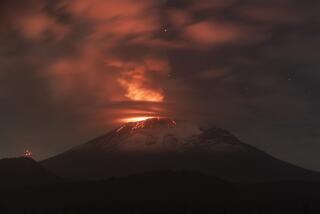Ecuadoreans Keeping Wary Eye on Volcano Called El Guagua
- Share via
PICHINCHA VOLCANO, Ecuador — Just five miles from Quito, Pichincha volcano groans and hisses with renewed activity, a possible warning of an eruption that scientists say could threaten the 1 million people of the Ecuadorean capital.
Four years ago Pichincha--also known as El Guagua, “the child,” in the local Indian language of Quechua--awoke after lying dormant for years. A winding road was built up its 15,918 foot slopes so scientists could keep a closer watch.
Although it is impossible to predict precisely when or if Pichincha will erupt, experts say the volcano must be closely monitored to prevent a tragedy like November’s eruption of Nevado del Ruiz in neighboring Colombia, which killed 25,000 people.
Pichincha’s last major eruption, in October, 1660, left Quito covered with a 16-inch layer of ash. The sky was blackened for four days and residents carried the local cathedral’s statue of the Virgin Mary through the streets as they prayed for deliverance.
Now, the volcano appears alive, rumbling deep in its interior and shaking slightly with the movement of superheated magma below.
On a recent visit, a scientific team climbed about 500 yards down the lip of the crater to a narrow ledge. A dome of fine ash was clearly visible on the crater floor a few hundred yards below.
In the middle of the dome, which has a 600-yard diameter, was the gaping dark mouth of a passage into the Earth. Around the dome, steam and gases spewed from the smaller “chimneys” at about 194 degrees Farenheit.
“At present there is no indication of imminent eruption, but it is important to keep a close check on the mountain,” said Bernardo Beate, a member of the Ecuadorean Engineering and Geological Committee.
Another member of the expedition, Hugo Yepez, said Ecuador urgently needs about 20 seismographs to check the activity of Pichincha and other active volcanoes in the Andes. Yepez says about a score of minor volcanic shocks are measured every month in and around the volcano.
More to Read
Sign up for Essential California
The most important California stories and recommendations in your inbox every morning.
You may occasionally receive promotional content from the Los Angeles Times.










